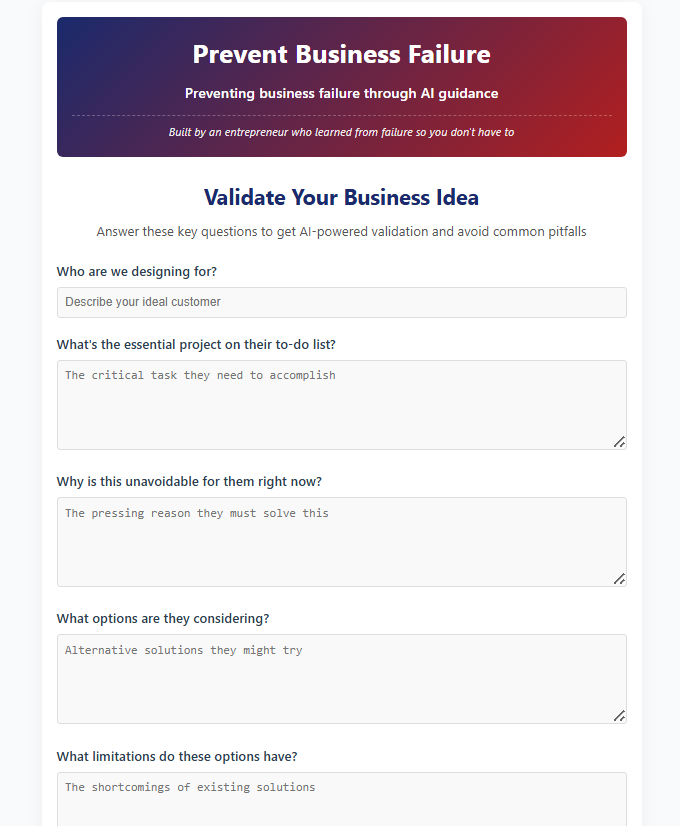
Fill business validator form to unlock your startup’s potential! Business idea validation is the critical first step that separates successful startups from costly failures in 2025. Before investing time, money, and energy into your venture, you need to test whether your idea solves a real problem for real people. Our comprehensive Business Validator Form is the must-use tool for modern entrepreneurs—designed to help you identify hidden risks, validate market demand, and strengthen your value proposition in just 5 minutes. This step-by-step guide shows you exactly how to complete each section like a pro, with real-world examples that bring clarity to the validation process.
Whether you’re a first-time founder or a serial entrepreneur, mastering this form will save you months of wasted effort and set your startup on the path to success .Business idea validation is the critical first step that separates successful startups from costly failures in 2025. Before investing time, money, and energy into your venture, you need to test whether your idea solves a real problem for real people. Our comprehensive Business Validator Form is the must-use tool for modern entrepreneurs—designed to help you identify hidden risks, validate market demand, and strengthen your value proposition in just 5 minutes. This step-by-step guide shows you exactly how to complete each section like a pro, with real-world examples that bring clarity to the validation process.
Whether you’re a first-time founder or a serial entrepreneur, mastering this form will save you months of wasted effort and set your startup on the path to success. Unlock your idea’s potential in minutes! Our free Business Validator helps you spot risks and strengths before you start. Here’s how to fill business validator form it out like a pro, with real examples.
How to Fill Business Validator Form: Step-by-Step Instructions
Step 1: Who are you designing for?
Describe your ideal customer.
Please keep it simple: Focus on who needs your solution most.
Example:
“College students who forget meals during exams. They need affordable, late-night food delivery.”
Why this works:
- Specific: Targets a clear group (college students).
- Identifies a pain point (forgetting meals).
Step 2: What’s their essential project?
What critical task must they complete?
Be precise: Name the one thing they can’t ignore.
Example:
“Ordering food quickly after midnight when campus cafeterias close.”
Key tip:
Use action words like “order,” “solve,” or “find.”
Step 3: Why is this unavoidable now?
What makes this urgent?
Highlight the “now” factor: Explain why they can’t wait.
Example:
“They’re studying all night and get hungry. Cafeterias are closed. They need food fast to focus.”
Why urgency matters:
Shows your solution solves a real problem. According to Entrepreneur.com, validating your business idea is crucial for startup success. Shows your solution solves a real problem.
Step 4: What options do they have?
What are they currently using?
List alternatives: Even imperfect ones.
Example:
- Driving to 24-hour diners
- Ordering from Uber Eats (high fees)
- Eating vending machine snacks
Be honest:
Acknowledging competitors makes your idea stronger.
Step 5: What limitations do these options have?
What’s wrong with current solutions?
Expose the gaps: Focus on frustrations.
Example:
- Driving wastes study time
- Uber Eats delivery fees break a student’s budget
- Snacks aren’t filling or healthy
Pro tip:
Use bullet points to keep it clear (like above!).
Real Example: CampusBites Food Delivery
See how all five steps come together:
Who?
“Busy college students pulling all-nighters.”
Project?
“Getting hot meals delivered after midnight.”
Urgent?
“They’re hungry now and can’t leave the library.”
Options?
Uber Eats, DoorDash, or junk food.
Limitations?
High fees, slow delivery, unhealthy choices.
Why This Works
✅ Specific: Targets real people (students).
✅ Urgent: Solves a “right now” problem (hunger during exams).
✅ Honest: Admits competitors but shows weaknesses.
“This form took me 5 minutes. The AI report revealed 3 risks I’d never considered!”
— Sarah J., startup founder
Ready to Test Your Idea?
Don’t guess if your business will work—know. Fill out the form now. It’s free, fast, and could save you months of wasted effort.
Your dream is worth validating!
Still unsure? Try our AI Business Coach for personalised help!



